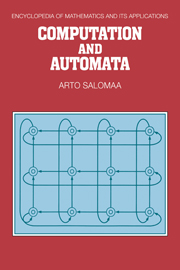Book contents
- Frontmatter
- Contents
- Editor's Statement
- Foreword by G. Rozenberg
- Acknowledgments
- Chapter 1 Introduction: Models of Computation
- Chapter 2 Rudiments of Language Theory
- Chapter 3 Restricted Automata
- Chapter 4 Turing Machines and Recursive Functions
- Chapter 5 Famous Decision Problems
- Chapter 6 Computational Complexity
- Chapter 7 Cryptography
- Chapter 8 Trends in Automata and Language Theory
- Historical and Bibliographical Remarks
- References
- Index
- ENCYCLOPEDIA OF MATHEMATICS AND ITS APPLICATIONS
Chapter 6 - Computational Complexity
Published online by Cambridge University Press: 05 April 2013
- Frontmatter
- Contents
- Editor's Statement
- Foreword by G. Rozenberg
- Acknowledgments
- Chapter 1 Introduction: Models of Computation
- Chapter 2 Rudiments of Language Theory
- Chapter 3 Restricted Automata
- Chapter 4 Turing Machines and Recursive Functions
- Chapter 5 Famous Decision Problems
- Chapter 6 Computational Complexity
- Chapter 7 Cryptography
- Chapter 8 Trends in Automata and Language Theory
- Historical and Bibliographical Remarks
- References
- Index
- ENCYCLOPEDIA OF MATHEMATICS AND ITS APPLICATIONS
Summary
BASIC IDEAS AND AXIOMATIC THEORY
The classification of mathematical problems into decidable and undecidable ones has been discussed quite extensively in previous chapters. Indeed, from the mathematical point of view, this classification is the most fundamental one. It is also of definite practical significance in discouraging attempts to design too-general systems, such as systems for deciding the equivalence of programs or the halting of a program. There are, in fact, instances of such attempts in the past!
However, this classification is too coarse in many respects. In Chapter 4 we considered a finer classification of undecidable problems in terms of reducibilities and degrees. We shall now discuss a finer classification of decidable problems in terms of their complexity. Two problems might both be decidable and yet one might be enormously more difficult to compute, which in practice might make this problem resemble an undecidable one. For example, if instances of reasonable size of one problem take only a few seconds to compute, whereas instances of comparable size of the other problem take millions of years (even if best computers are available), it is clear that the latter problem should be considered intractable compared with the former one. Hence, having established the decidability of a particular problem, we should definitely study its complexity—that is, how difficult it is to settle specific instances of the problem.
- Type
- Chapter
- Information
- Computation and Automata , pp. 139 - 185Publisher: Cambridge University PressPrint publication year: 1985



